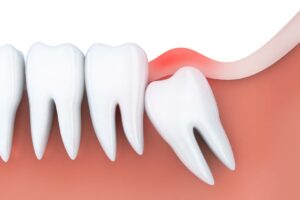 If your wisdom teeth are giving you problems, it’s not something you want to ignore. Evolution has caused the human jaw to narrow, which means you may not have enough room in your mouth to accommodate a third set of molars. If there isn’t enough room to erupt, the teeth can be partially or fully impacted. According to the American Academy of Oral and Maxillofacial Surgeons, 1 in every 10 adults has at least 1 impacted wisdom tooth. Although it may not seem concerning, your health can suffer if the teeth aren’t removed.
If your wisdom teeth are giving you problems, it’s not something you want to ignore. Evolution has caused the human jaw to narrow, which means you may not have enough room in your mouth to accommodate a third set of molars. If there isn’t enough room to erupt, the teeth can be partially or fully impacted. According to the American Academy of Oral and Maxillofacial Surgeons, 1 in every 10 adults has at least 1 impacted wisdom tooth. Although it may not seem concerning, your health can suffer if the teeth aren’t removed.
Complications of Impacted Wisdom Teeth
Serious complications can occur for many patients with impacted wisdom teeth, including:
- Pain: It’s not unusual for the gums to become inflamed, and you can experience dental pain.
- Infections: Impacted wisdom teeth can become infected or develop cysts. Infection can damage your tooth and underline jawbone. Bacteria from the infection may also enter your bloodstream, increasing your risk of various health issues, like cardiovascular disease.
- Nutritional Deficiencies: If your mouth hurts, it can be difficult to eat certain foods, so you may eliminate them from your diet. This can lead to nutritional deficiencies that can harm your health.
- Damage to Nearby Teeth: Besides infections, an impacted tooth can damage nearby teeth. It can put pressure on a surrounding tooth, causing breaks or fractures. It can also cause significant overcrowding that can affect your bite. Overcrowded teeth are more difficult to keep clean, increasing your risk of tooth decay and gum disease.
Types of Wisdom Tooth Extractions
If your wisdom teeth are giving you grief, it’s best to visit your dentist for a consultation. They’ll examine your mouth to determine the best method to remove the molars, like:
- Simple Extraction: A simple extraction is recommended when a tooth is fully visible above the gum tissue. A local numbing agent is used to block any pain as the tooth is loosened and extracted using forceps.
- Surgical Extraction: If a tooth is partially or fully hidden below the gum tissue, it will need to be surgically removed. Sedation is used to keep you comfortable as your dentist opens your gum tissue to access your tooth. Your tooth is broken into smaller pieces and removed before your tissue is sutured closed.
No matter the method, removing impacted wisdom teeth will restore your oral health and safeguard your wellness. Although you’ll have a bit of recovery, it’s time well spent to keep your mouth and body healthy.
About Dr. Theresa Lassetter
Dr. Lassetter earned her dental degree from the University of Texas Health Science Center School of Dentistry and has regularly pursued continuing education in many specialties, like tooth extractions. She is a member of various professional organizations, including the American Dental Association. If you need a wisdom tooth consultation, request an appointment through our website or call (254) 848-0240.
